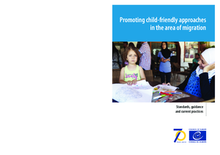Displaying 291 - 300 of 839
This compilation contributes to the implementation of the objectives of the Action Plan on protecting refugee and migrant children in Europe, adopted by the Committee of Ministers of the Council of Europe, by bringing together international and European standards on child-friendly practices in the context of migration with illustrations from practice of the kind of initiatives, programmes and procedures that serve to implement these standards.
This article elaborates on provisions concerning the international protection system for minor migrants. It examines entry strategies put into place by young migrants facing the Spanish migration system.
El presente estudio aborda la realidad del impacto de la migración forzosa en niños, niñas y adolescentes venezolanos.
This paper examines the causal effects of parents' migration on the education, physical, and mental health of left‐behind children aged 11 to 15 years in Romania, a country where increasingly more children have parents working abroad.
The aim of this study was to systematically review studies where the physical health consequences for children left behind (CLB) were analysed.
The purpose of this study was to assess the possible impact of parents’ migration on emotional and behavioral problems of their left-behind children.
Using nationally representative monitoring data for migrant workers aged 15 to 59 years in China, this study sought to estimate the prevalence of left-behind children (LBC) in each province, and to examine risk factors being left behind at both the individual and provincial level.
The purpose of this paper is to study an examination of existing international research concerning unaccompanied refugee minors (URM) and of whether, and if so how, issues relating to drug use and criminality among these children are discussed in the international literature.
This study finds that the size of the nuclear family has a significant positive relationship with refugees’ mental health, whereas family separation has a significant negative relationship.
This study explored the lived experiences of 23 kin caregivers raising children left behind in rural Northeast China while their migrant parents worked and lived in cities.


